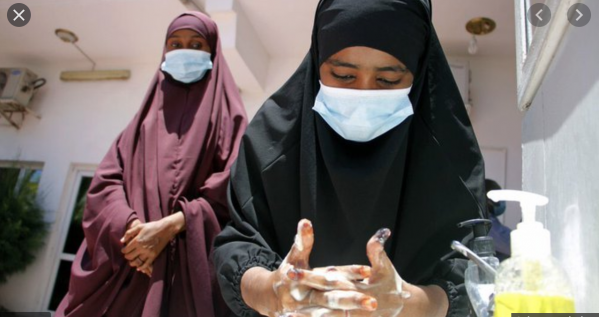Somalia was in the civil war since 1988, which led to insecurity, famine, and displacement within Somalia and the neighboring countries. Somalia has more than 2.6 million displaced people and some five million Somalis are reported by the UN to be in need of humanitarian assistance. According to the UN’s global humanitarian response plan, Somalia has an average of two health workers per 100,000 persons, compared to the global standard of 25 per 100,000. UN has ranked Somalia as one of the most vulnerable countries at risk of food insecurity and pandemics
As the COVID-19 virus spreads over the world, the first COVID-19 case was registered in Mogadishu on March 16, causing the Federal Government to suspend all international flights. Domestic flights have since temporally been banned though the government cannot control the movement of people and goods within the country by road. Some of the government initiatives include ordering the closure of schools; restriction of mass gatherings; advice on Infection Prevention and Control measures including social distancing and hand and respiratory hygiene among others. In spite of these efforts, Somalia has a fragile health system and limited capacity to respond and prevent the potential spread of COVID-19. It does not have the capacity to test COVID-19, challenging the ability for early detection. As stated by Minister of Health and Social Care, Dr. Fowzia Abikar Nur, in a Somali Voice of America interview, the Federal Government does not have the capacity to test the virus inside Somalia but uses a WHO-certified laboratory in Kenya.
Remittance and the Somali diaspora
According to the world bank due to the COVID-19 crisis, remittance flows to the sub-Sahara African region are expected to decline by 23.1 percent to reach $37 billion in 2020, while recovery of 4 percent is expected in 2021. Remittances from Somalis abroad are estimated at between US$1.3 – 2 billion annually, possibly much more; where GDP is estimated at US$6bn. Approximately 40% of households in the country are estimated to receive these funds directly. The vast majority of direct recipients are based in urban settings, but many send on a portion of this money to rural relatives.
Somali diaspora is facing financial and health problems that will have an impact on the remittances sent home. Most Somalis working in sectors such as transportation, retail, domestic and office cleaning, and restaurant/hospitality are being laid off. Cafes and teashops are closed in many locations; the taxi business is at a standstill. The government’s support won’t be enough to share with families. Likewise, diaspora response in times of crisis such as droughts, floods, and other humanitarian crises will be limited due to the government’s measures.
Somalia is facing a humanitarian crisis; COVID-19 is posing an additional challenge in an already fragile context where it may further hinder access to basic services, leaving the population highly vulnerable. The durable solutions and resilience efforts invested over the last years could easily be reversed if the humanitarian and development actors and the Somali diaspora do not act quickly towards preparedness and response to COVID-19.


